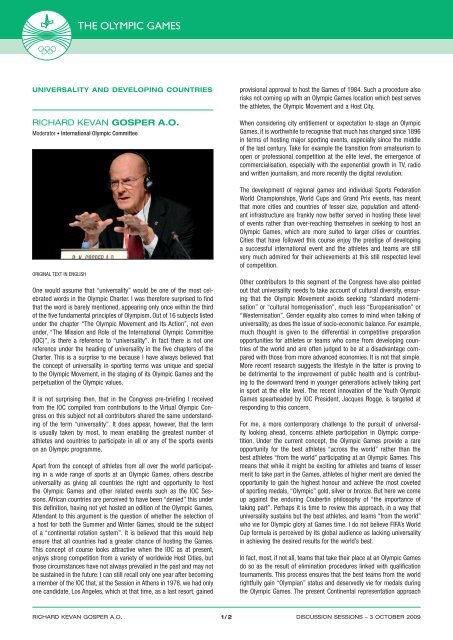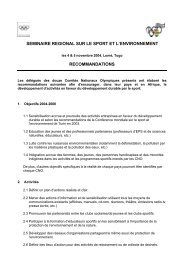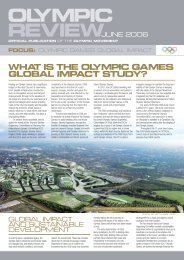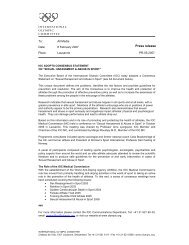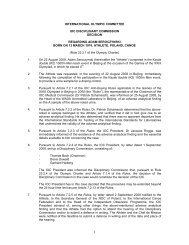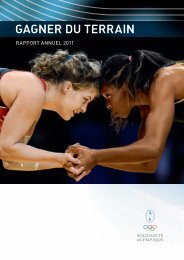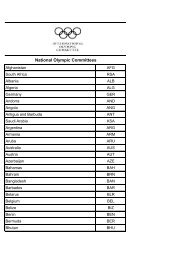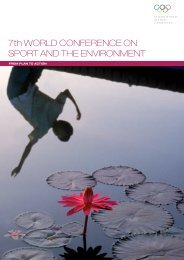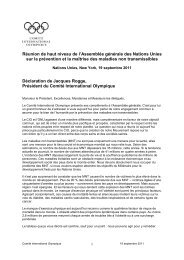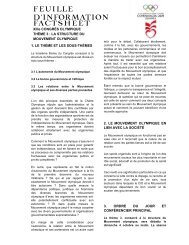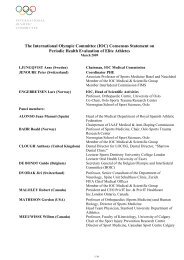RICHARD KEVAN GOSPER A.O. - International Olympic Committee
RICHARD KEVAN GOSPER A.O. - International Olympic Committee
RICHARD KEVAN GOSPER A.O. - International Olympic Committee
Create successful ePaper yourself
Turn your PDF publications into a flip-book with our unique Google optimized e-Paper software.
UnIVERSAlItY AnD DEVElOPInG COUntRIES<br />
<strong>RICHARD</strong> <strong>KEVAN</strong> <strong>GOSPER</strong> A.O.<br />
Moderator • <strong>International</strong> <strong>Olympic</strong> <strong>Committee</strong><br />
Original text in english<br />
One would assume that “universality” would be one of the most celebrated<br />
words in the <strong>Olympic</strong> Charter. i was therefore surprised to find<br />
that the word is barely mentioned, appearing only once within the third<br />
of the five fundamental principles of Olympism. Out of 16 subjects listed<br />
under the chapter “the <strong>Olympic</strong> Movement and its action”, not even<br />
under, “the Mission and role of the international <strong>Olympic</strong> <strong>Committee</strong><br />
(iOC)”, is there a reference to “universality”. in fact there is not one<br />
reference under the heading of universality in the five chapters of the<br />
Charter. this is a surprise to me because i have always believed that<br />
the concept of universality in sporting terms was unique and special<br />
to the <strong>Olympic</strong> Movement, in the staging of its <strong>Olympic</strong> games and the<br />
perpetuation of the <strong>Olympic</strong> values.<br />
it is not surprising then, that in the Congress pre-briefing i received<br />
from the iOC compiled from contributions to the Virtual <strong>Olympic</strong> Congress<br />
on this subject not all contributors shared the same understanding<br />
of the term “universality”. it does appear, however, that the term<br />
is usually taken by most, to mean enabling the greatest number of<br />
athletes and countries to participate in all or any of the sports events<br />
on an <strong>Olympic</strong> programme.<br />
apart from the concept of athletes from all over the world participating<br />
in a wide range of sports at an <strong>Olympic</strong> games, others describe<br />
universality as giving all countries the right and opportunity to host<br />
the <strong>Olympic</strong> games and other related events such as the iOC sessions.<br />
african countries are perceived to have been “denied” this under<br />
this definition, having not yet hosted an edition of the <strong>Olympic</strong> games.<br />
attendant to this argument is the question of whether the selection of<br />
a host for both the summer and Winter games, should be the subject<br />
of a “continental rotation system”. it is believed that this would help<br />
ensure that all countries had a greater chance of hosting the games.<br />
this concept of course looks attractive when the iOC as at present,<br />
enjoys strong competition from a variety of worldwide host Cities, but<br />
those circumstances have not always prevailed in the past and may not<br />
be sustained in the future. i can still recall only one year after becoming<br />
a member of the iOC that, at the session in athens in 1978, we had only<br />
one candidate, los angeles, which at that time, as a last resort, gained<br />
<strong>RICHARD</strong> <strong>KEVAN</strong> GoSPER A.o.<br />
1 / 2<br />
provisional approval to host the games of 1984. such a procedure also<br />
risks not coming up with an <strong>Olympic</strong> games location which best serves<br />
the athletes, the <strong>Olympic</strong> Movement and a host City.<br />
When considering city entitlement or expectation to stage an <strong>Olympic</strong><br />
games, it is worthwhile to recognise that much has changed since 1896<br />
in terms of hosting major sporting events, especially since the middle<br />
of the last century. take for example the transition from amateurism to<br />
open or professional competition at the elite level, the emergence of<br />
commercialisation, especially with the exponential growth in tV, radio<br />
and written journalism, and more recently the digital revolution.<br />
the development of regional games and individual sports Federation<br />
World Championships, World Cups and grand Prix events, has meant<br />
that more cities and countries of lesser size, population and attendant<br />
infrastructure are frankly now better served in hosting these level<br />
of events rather than over-reaching themselves in seeking to host an<br />
<strong>Olympic</strong> games, which are more suited to larger cities or countries.<br />
Cities that have followed this course enjoy the prestige of developing<br />
a successful international event and the athletes and teams are still<br />
very much admired for their achievements at this still respected level<br />
of competition.<br />
Other contributors to this segment of the Congress have also pointed<br />
out that universality needs to take account of cultural diversity, ensuring<br />
that the <strong>Olympic</strong> Movement avoids seeking “standard modernisation”<br />
or “cultural homogenisation”, much less “europeanisation” or<br />
“Westernisation”. gender equality also comes to mind when talking of<br />
universality, as does the issue of socio-economic balance. For example,<br />
much thought is given to the differential in competitive preparation<br />
opportunities for athletes or teams who come from developing countries<br />
of the world and are often judged to be at a disadvantage compared<br />
with those from more advanced economies. it is not that simple.<br />
More recent research suggests the lifestyle in the latter is proving to<br />
be detrimental to the improvement of public health and is contributing<br />
to the downward trend in younger generations actively taking part<br />
in sport at the elite level. the recent innovation of the Youth <strong>Olympic</strong><br />
games spearheaded by iOC President, Jacques rogge, is targeted at<br />
responding to this concern.<br />
For me, a more contemporary challenge to the pursuit of universality<br />
looking ahead, concerns athlete participation in <strong>Olympic</strong> competition.<br />
Under the current concept, the <strong>Olympic</strong> games provide a rare<br />
opportunity for the best athletes “across the world” rather than the<br />
best athletes “from the world” participating at an <strong>Olympic</strong> games. this<br />
means that while it might be exciting for athletes and teams of lesser<br />
merit to take part in the games, athletes of higher merit are denied the<br />
opportunity to gain the highest honour and achieve the most coveted<br />
of sporting medals, “<strong>Olympic</strong>” gold, silver or bronze. But here we come<br />
up against the enduring Coubertin philosophy of “the importance of<br />
taking part”. Perhaps it is time to review this approach, in a way that<br />
universality sustains but the best athletes, and teams “from the world”<br />
who vie for <strong>Olympic</strong> glory at games time. i do not believe FiFa’s World<br />
Cup formula is perceived by its global audience as lacking universality<br />
in achieving the desired results for the world’s best.<br />
in fact, most, if not all, teams that take their place at an <strong>Olympic</strong> games<br />
do so as the result of elimination procedures linked with qualification<br />
tournaments. this process ensures that the best teams from the world<br />
rightfully gain “Olympian” status and deservedly vie for medals during<br />
the <strong>Olympic</strong> games. the present Continental representation approach<br />
DISCUSSIoN SESSIoNS – 3 oCtobER 2009
enabling all 205 national <strong>Olympic</strong> <strong>Committee</strong>s (nOCs) to gain some<br />
sports participation in the <strong>Olympic</strong> games, under the banner of universality,<br />
however, falls on to the individual athlete sports.<br />
there is a recent iOC analysis of swimmers “without time”, (i.e.<br />
swimmers with times outside of qualifying limits for championship<br />
competition) participating in the Beijing 2008 <strong>Olympic</strong> games, which<br />
demonstrates that had it not been for the universality inspired iOC<br />
“Continental representation formula” (the “wildcard” factor), 82 nOCs’<br />
swimming entrants would not have been entitled to participate. in<br />
other words, 135 swimmers would not have been in the pool. it won’t<br />
surprise you to learn that in the iOC analysis of athletics in Beijing,<br />
90 nOCs’ athlete entrants would not have been entitled to participate.<br />
in other words, 143 athletes would not have been in the stadium.<br />
What this means, is that despite the growth of national and regional<br />
games and other premier competitions across almost all of the sports<br />
on the <strong>Olympic</strong> Programme, the iOC’s games entry qualification for<br />
a young athlete from across the world with modest experience and<br />
talent enables entry onto the <strong>Olympic</strong> stage, sometimes with disappointing<br />
outcomes and the risk of humiliation, to the regrettable<br />
exclusion of another more deserving competitor. their aspirations and<br />
achievements as i have already suggested, might better be recognised<br />
within themselves and across their home population by achievement<br />
of performance records or medals in a more realistic and culturally<br />
stimulating regional environment.<br />
the real implication here is that while the iOC claims the <strong>Olympic</strong><br />
games to be the elite multi-sports quadrennial event, by comparison<br />
with most international Federation World Championship or Cup events,<br />
which present their best athletes from the world, the <strong>Olympic</strong> games<br />
actually comprise quite a long trail of sub-standard athletes who nevertheless<br />
gain the prestigious entitlement of becoming an Olympian.<br />
the modification or removal of Continental representation constraints<br />
would have the benefit of allowing a number of highly qualified athletes<br />
to rightfully take part in the games, adopting a system followed by<br />
some federations where some countries in some sports could have<br />
more than the current mandatory three athletes.<br />
all of this has implications for other aspects of the games, for example,<br />
the parade of athletes at the Opening Ceremony, but with proper<br />
thought changes could be accommodated, and importantly the spirit of<br />
universality would be sustained as it does in so many other international<br />
events.<br />
Well on this last observation of mine i should have raised a sufficient<br />
degree of <strong>Olympic</strong> heresy to stimulate your interest in what our panel<br />
has to say and you will have the right to ask questions.<br />
<strong>RICHARD</strong> <strong>KEVAN</strong> GoSPER A.o.<br />
2 / 2<br />
UnIVERSAlItY AnD DEVElOPInG COUntRIES<br />
DISCUSSIoN SESSIoNS – 3 oCtobER 2009


